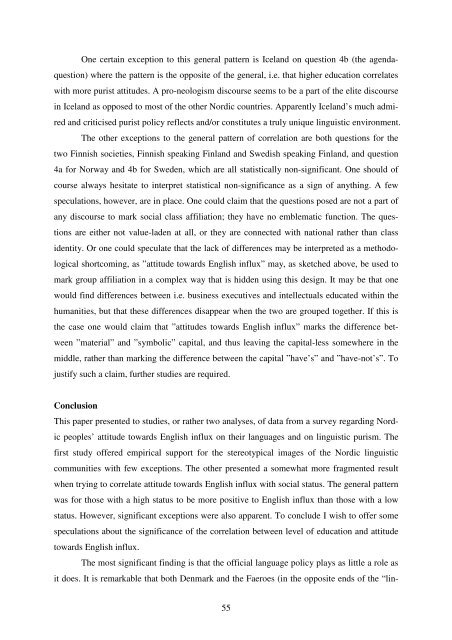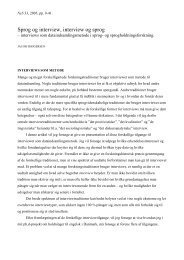Hør dog hvad de siger - Note-to-Self: Trials & Errors
Hør dog hvad de siger - Note-to-Self: Trials & Errors
Hør dog hvad de siger - Note-to-Self: Trials & Errors
Create successful ePaper yourself
Turn your PDF publications into a flip-book with our unique Google optimized e-Paper software.
One certain exception <strong>to</strong> this general pattern is Iceland on question 4b (the agenda-<br />
question) where the pattern is the opposite of the general, i.e. that higher education correlates<br />
with more purist attitu<strong>de</strong>s. A pro-neologism discourse seems <strong>to</strong> be a part of the elite discourse<br />
in Iceland as opposed <strong>to</strong> most of the other Nordic countries. Apparently Iceland’s much admi-<br />
red and criticised purist policy reflects and/or constitutes a truly unique linguistic environment.<br />
The other exceptions <strong>to</strong> the general pattern of correlation are both questions for the<br />
two Finnish societies, Finnish speaking Finland and Swedish speaking Finland, and question<br />
4a for Norway and 4b for Swe<strong>de</strong>n, which are all statistically non-significant. One should of<br />
course always hesitate <strong>to</strong> interpret statistical non-significance as a sign of anything. A few<br />
speculations, however, are in place. One could claim that the questions posed are not a part of<br />
any discourse <strong>to</strong> mark social class affiliation; they have no emblematic function. The ques-<br />
tions are either not value-la<strong>de</strong>n at all, or they are connected with national rather than class<br />
i<strong>de</strong>ntity. Or one could speculate that the lack of differences may be interpreted as a methodo-<br />
logical shortcoming, as ”attitu<strong>de</strong> <strong>to</strong>wards English influx” may, as sketched above, be used <strong>to</strong><br />
mark group affiliation in a complex way that is hid<strong>de</strong>n using this <strong>de</strong>sign. It may be that one<br />
would find differences between i.e. business executives and intellectuals educated within the<br />
humanities, but that these differences disappear when the two are grouped <strong>to</strong>gether. If this is<br />
the case one would claim that ”attitu<strong>de</strong>s <strong>to</strong>wards English influx” marks the difference bet-<br />
ween ”material” and ”symbolic” capital, and thus leaving the capital-less somewhere in the<br />
middle, rather than marking the difference between the capital ”have’s” and ”have-not’s”. To<br />
justify such a claim, further studies are required.<br />
Conclusion<br />
This paper presented <strong>to</strong> studies, or rather two analyses, of data from a survey regarding Nord-<br />
ic peoples’ attitu<strong>de</strong> <strong>to</strong>wards English influx on their languages and on linguistic purism. The<br />
first study offered empirical support for the stereotypical images of the Nordic linguistic<br />
communities with few exceptions. The other presented a somewhat more fragmented result<br />
when trying <strong>to</strong> correlate attitu<strong>de</strong> <strong>to</strong>wards English influx with social status. The general pattern<br />
was for those with a high status <strong>to</strong> be more positive <strong>to</strong> English influx than those with a low<br />
status. However, significant exceptions were also apparent. To conclu<strong>de</strong> I wish <strong>to</strong> offer some<br />
speculations about the significance of the correlation between level of education and attitu<strong>de</strong><br />
<strong>to</strong>wards English influx.<br />
The most significant finding is that the official language policy plays as little a role as<br />
it does. It is remarkable that both Denmark and the Faeroes (in the opposite ends of the “lin-<br />
55



